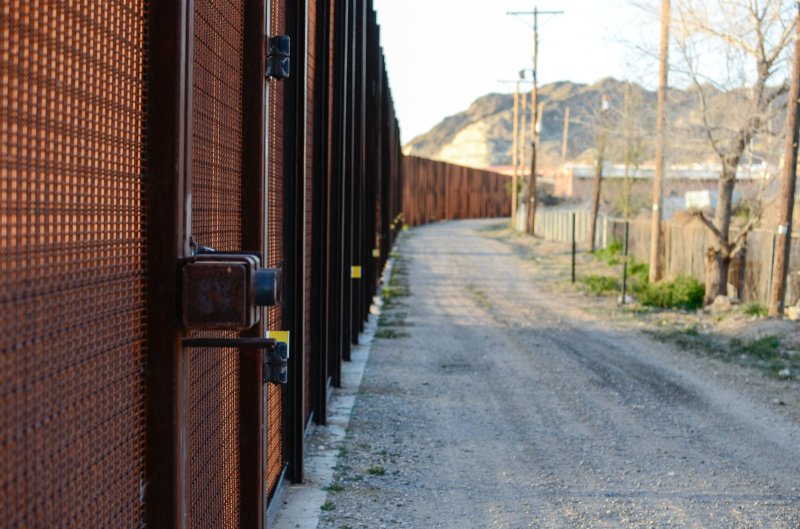1 of 2 | The border fence runs just behind Doniphan Park in El Paso, Texas, separating the city from Juarez, Mexico. It was built a decade ago as part of the Secure Fences Act of 2006 under President George Bush. File Photo by Natalie Krebs/UPI |
License Photo
EL PASO, Texas, March 21 (UPI) -- U.S. immigration authorities expect to release thousands of apprehended migrants into El Paso, Texas, starting Thursday, straining shelters' temporary housing capacity and forcing city officials to seek volunteers so the migrants do not end up sleeping on the street.
Authorities did not explain why migrant numbers are surging, but Ciudad Juárez, Mexico, has 3,000 migrants staying in full shelters, waiting to cross into the United States. The director of Ciudad Juarez's migrant shelter recently turned to social media to urge migrants to stop traveling to the border city because there is not enough temporary housing.
The problem, which has been building for months, became critical Tuesday when Border Patrol agents took into custody -- in five minutes -- more than 400 migrants who were crossing the Rio Grande River illegally between the downtown areas of Ciudad Juárez and El Paso.
The agency said it is averaging more than 570 apprehensions a day, with most occurring in the El Paso metropolitan area -- an area that has had 15-foot-high border fencing for the past decade.
"When people are denied access at the ports of entry, large groups of immigrants and would-be asylum seekers are crossing illegally," said Christopher Davis, a volunteer with a local shelter, Annunciation House. The large number of illegal crossings has "saturated" authorities and the shelters they are released to, Davis said.
Annunciation House's resources in El Paso are stretched so thin it has started to send some migrants to church-run shelters in nearby Las Cruces and farther away to Albuquerque, N.M., Davis said.
Immigration officials also said they did not have capacity to deal with the surge in migrants.
"These numbers continue to stretch the resources available to the U.S. Border Patrol to deal with this influx and the challenges that come with it," the agency said in a statement.
Annunciation House said it has received more than 600 migrants each day this week from U.S. immigration authorities. The shelter's director, Ruben Garcia, told local media he expected authorities to release more than 1,800 migrants in the coming days and that his organization has spent the "unsustainable amount" of more than $1 million in the past five months on hotel rooms.
When Annunciation House filled up this week, city officials prepared a municipal recreational sports complex to house migrants to discourage immigration authorities from dropping people at the bus station, which they did in December. Instead, the city paid for hotel rooms for 150 migrants.
On Wednesday, the city's Office of Emergency Management called for volunteers to help with the migrant surge over the weekend.
The Border Patrol has responded to the surge by opening an overflow tent to process migrants near its station under the bridge at the Paso del Norte port of entry. Migrants with Mylar blankets could be seen outside the tent Monday receiving food from a soldier.
Migrants who cross illegally and who are apprehended with their children spend several days in detention for processing and then receive dates for court appointments to explain their asylum claims. They then are released to local shelters that provide housing for a few days and help them find transportation to family or friends in the United States. El Paso's bus station is filled with migrant parents and their children during daylight hours.
"We tell them not to book bus tickets at night because we don't have any drivers at night," said Leann Beck, a driver who volunteers to ferry migrants to the bus station and airport for local shelters. "Every single day, we see people. It's just constant," Beck said.
Most people waiting in the bus station come from Central America and have applied for asylum, Beck said.
"I crossed with my son at the bridge on Friday," said Iris Padilla, an asylum seeker who left Copan, Honduras, in January. Padilla said she fled Honduras because her son's father wanted to recruit him into a gang.
"We'd been waiting at the migrant shelter in Ciudad Juárez for a month. People asked me 'Why don't you cross the river?' but I told them I wanted to wait and cross the right way at the bridge," Padilla said.
U.S. immigration authorities detained and processed Padilla and her son for three days and released them to Annunciation House. On Wednesday, the mother and son stood inside the Greyhound bus station, waiting for a three-day journey to Tampa, Fla., where she said a friend would house them.
"The authorities treated us very well. I have no complaints," Padilla said.
U.S. Immigration and Customs Enforcement detains single men and women if there is bed space in detention facilities, Annunciation House's Davis said. "We see some single men and women but not many," he said.
Meanwhile, the Trump administration announced Wednesday it had expanded its controversial remain in Mexico policy, formally known as the migrant protection protocols, to El Paso. The policy, which began first in Tijuana and then expanded to Mexicali, returns asylum seekers to wait in Mexico while their case proceeds through U.S. immigration court.
Critics contend the policy sends people back to wait in dangerous border cities, like Ciudad Juárez, where 60 people have been slain in March, about three people a day.
"With this shameful policy, the administration is endangering lives, abandoning its obligation to bring forward smart solutions for our broken immigration system and imposing on another country the task of solving our immigration challenges," said U.S. Rep. Veronica Escobar, D-Texas.
Escobar said she would introduce legislation to end funding for the remain in Mexico program.
"Enough is enough," Escobar said in a statement. "I urge my colleagues in Congress to stand up against President Trump's anti-immigrant agenda."















